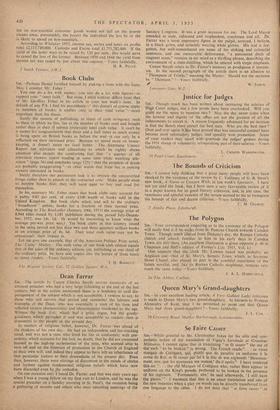Dean Farrar
Sta.—The article by Canon Charles Smyth revives memories of an eminent preacher who had a very large following at the end of the last century, but in the article mentioned there is a, tendency to acid dis- paragement of the subject which is not acceptable, I venture to say, to those who still survive that period and remember the laboors and triumphs of the Dean. who was essentially a man of his time and reflected certain characteristics and 'idiosyncrasies incidental to the age. Witness the hook Eric, which had a great vogue, but the goody- goodiness which pervaded it and was acceptable to readers then -is distasteful to the people of the present day.
In matters of religious belief, however, Dr. Farrar was ahead of the thinkers of his own day.. He had an independent and far-reaching mind, and was not a man who lived his life in conformity with pre- cedents, which accounts for the fact, no doubt, that he did not commend himself to the high-up ecclesiastics of the time, who seemed able to turn off and on the fountain of promotion in the ChUrch of England at their own will; and indeed they appear to have left an inheritance of that particular feature to their descendants of the present day. Even then, however, there were stirrings of discontent in the minds of clerics and laymen against fundamental religious beliefs which have now been discarded even by the orthodox.
On one occasion only I heard Dr. Farrar, and that was sixty years ago when I was a young fellow,on my first visit to London, and he was the special preacher on a Sunday morning in St. Paul's, the occasion being a gathering of savants and others who were attending meetings of the Sanitary Congress. It was a great occasion for me. The Lord Mayor attended in state, rubicund and resplendent, coachmen and all. Dr. Farrar was a most impressive figure jn the pulpit, arrayed, I believe, in a black gown, and certainly wearing white gloves. His text is for- gotten, but well-remembered are some of his striking and colourful sentences, and one memorable deliverance, " a putrescent ditch of stagnant scum," remains in my mind as a thrilling phrase, describing the environment of a slum-dwelling, which he uttered with tragic emphasis.
Canon Smyth refers to Dr. Farrar's memory as prodigious if inaccur- ate. In the second paragraph of the article there is an allusion to " Thompson of Trinity," meaning the Master. Should not the surname be " Thomson." ?—Yours faithfully, W. JAMES. Lancaster Gale, W.2.


































 Previous page
Previous page